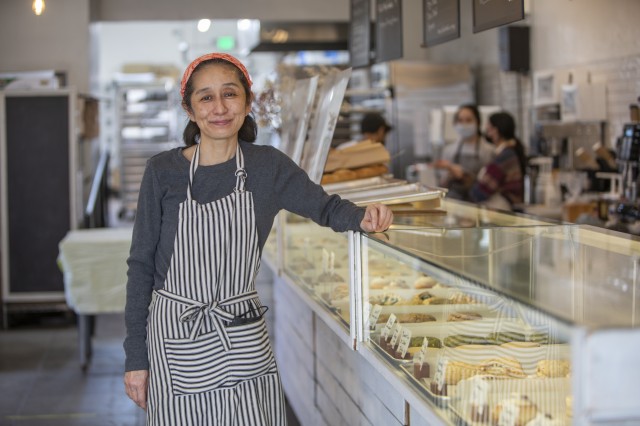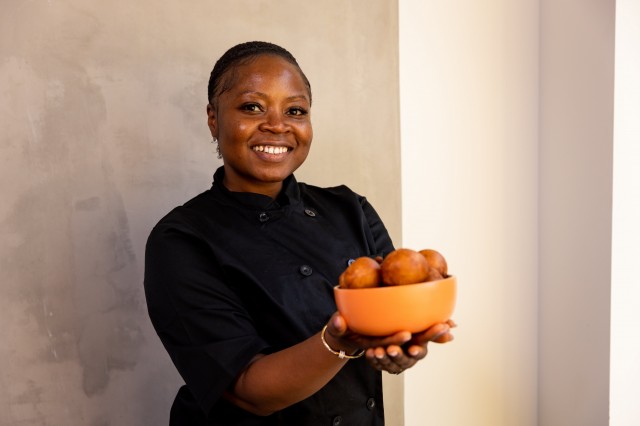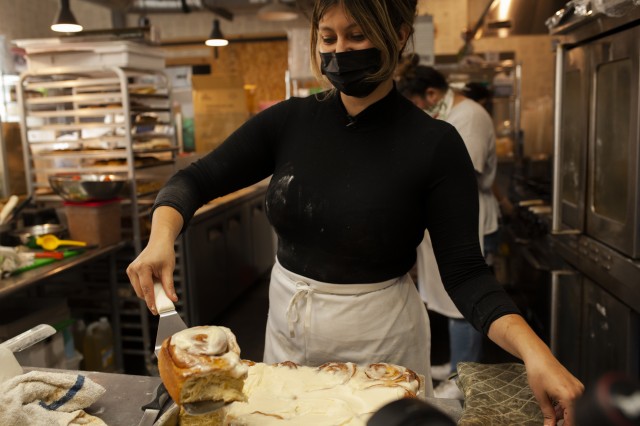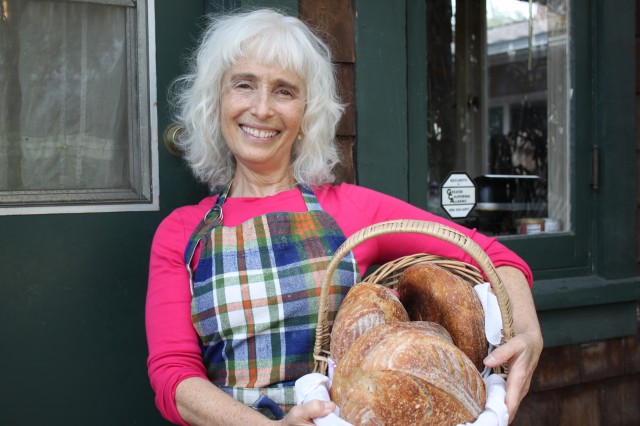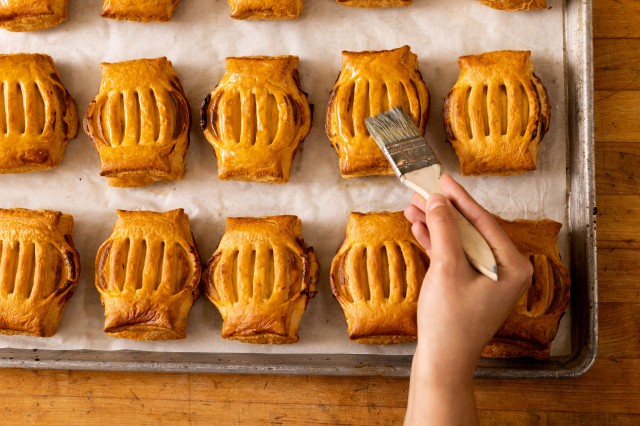
Made With Love
Jennifer Toomey | Huckleberry Bakery & Café
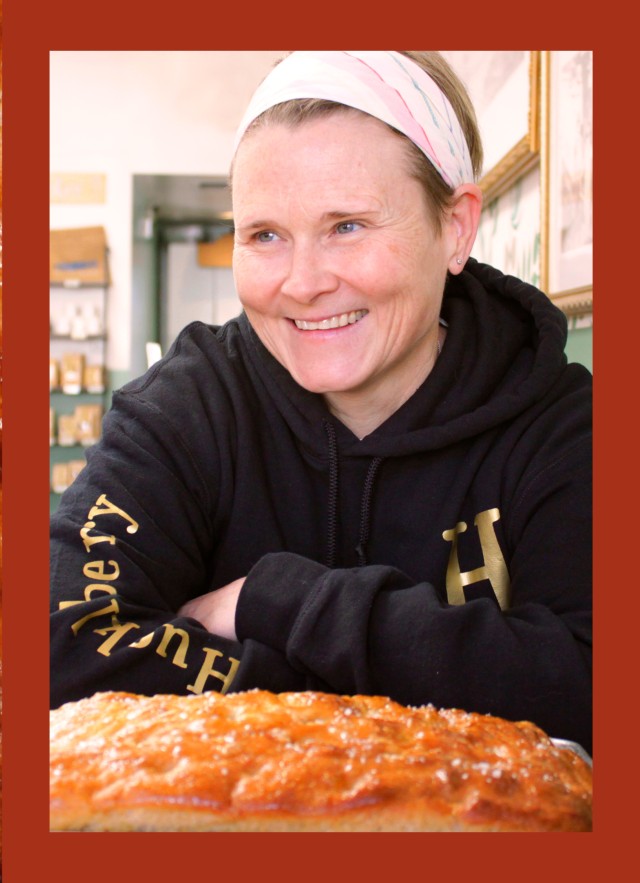
Kneaded: L.A. Bread Stories, celebrates L.A. history, heritage, and communities through the lens of bread.
Jennifer Toomey, Head Chef & Partner at Huckleberry Bakery & Café, shares with us how she got her start in the restaurant world, the gravity of good quality bread and the impact of inclusivity on staff well-being. In Toomey’s interview we’re reminded that for her, bread is nourishing of both the body and soul, no matter who you are.
One of the servers once explained to me that the Italian word scarpetta means the art of gathering all the sauce left on your plate with a piece of bread—and I thought, “Yes, that’s all I want in my life.”
Jennifer Toomey
HOW LONG HAVE YOU BEEN COOKING, AND HOW DID YOU GET STARTED AT Huckleberry Bakery & Café?
My mom was a chef, so I’ve been cooking since I was twelve. But professionally, I’d say I’ve been cooking for almost 28 years. I grew up in the San Francisco area and got my degree in something completely different, but I realized I didn’t want to work at a desk all day. While teaching at the Art Institute, a colleague told me that I needed to try Milo + Olive because they had the best pizza. So my wife and I went to the tiny restaurant, which only had two tables at the time, and I thought, “I could really see myself working here.”
I got laid off and applied to Milo + Olive. What I loved about Milo + Olive is that they are part of a restaurant group called Rustic Canyon Family—a group of chef-driven dining destinations that embrace seasonality and sustainability. It was the first time in my professional career that I thought I could work here and would love to run this place. I willed it to happen, and then the rest is history.
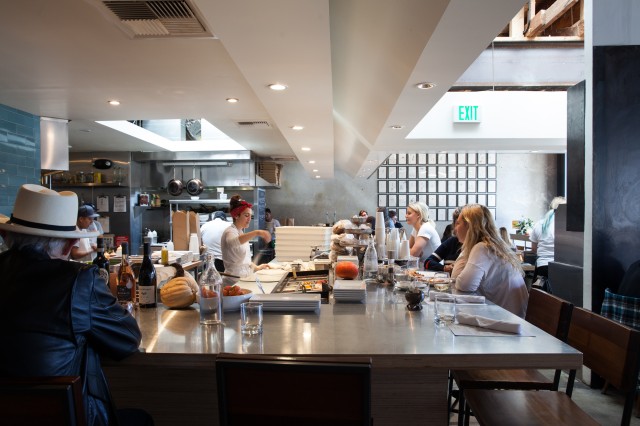
With Milo +Olive’s lovely indoor dining space and commitment to fresh foods, Toomey envisioned herself working there.
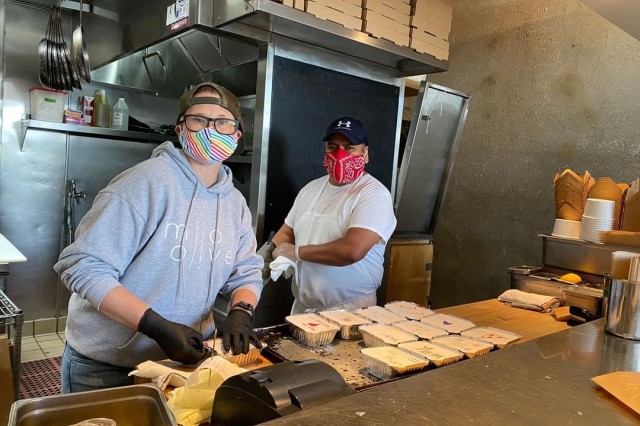
During the 2020 quarantine, Toomey and the team at Milo + Olive provided warm meals for the courageous nurses and doctors at Ronald Reagan UCLA Medical Center.
1 of 1
With Milo +Olive’s lovely indoor dining space and commitment to fresh foods, Toomey envisioned herself working there.
During the 2020 quarantine, Toomey and the team at Milo + Olive provided warm meals for the courageous nurses and doctors at Ronald Reagan UCLA Medical Center.
WHO IS THE TYPICAL HUCKLEBERRY CUSTOMER?
We run the gamut across who comes in here. There are families on the weekend bringing their kids, and it’s loud, crazy, and fun—but we also get younger couples. It’s nice to see the variety of people and how they understand the Rustic Canyon family ethos.
I think there’s a lot to be said about the ethos and the mission of the Rustic Canyon Family. We provide nutritious and delicious food and promote the use of organic foods, and local farms to get the best quality foods. Because of this [dedication to quality], our prices are a little higher, so it sometimes requires a lot of conversation with the customer. On the other hand, we get customers who say, “Yes! I’m so excited for someplace that has Zuckerman Farms asparagus!” To me, that’s the payoff—having that engagement with a customer. I try my best to get out here and talk to people. I’ll talk to guests for twenty minutes about a piece of lettuce. I used to think, “Who cares but me?” But now I know somebody does care, and that’s a great part of my day.
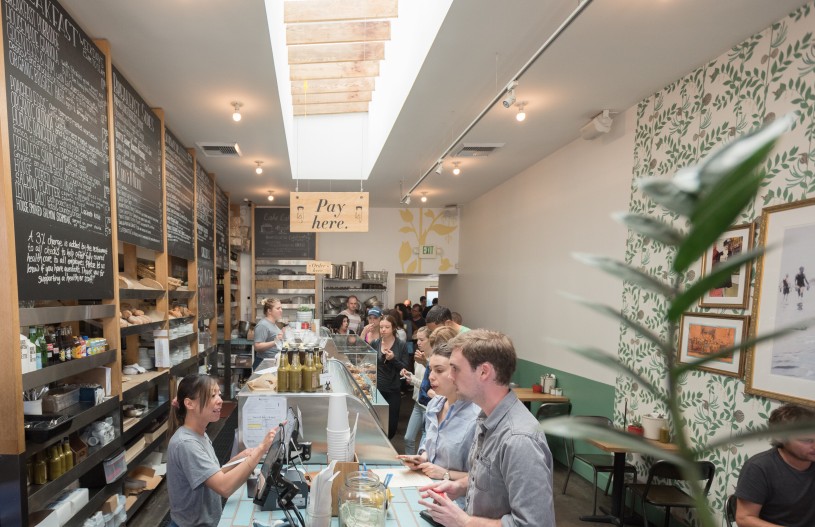
WHAT MEMORIES OF BREAD SHAPED YOU AS A CHEF?
Growing up in San Francisco, I always loved sourdough. My grandmother would take me to a lot of fancy restaurants where bread was always a part of the meal. A simple roll was brought to the table with heart-shaped butter. But as a kid, if the bun wasn’t good on the cheeseburger I ordered, I knew right away I was not eating it. Bread is the vehicle [of the meal] that makes all the difference in the world.
I am the same way with pizza. I could care less about what’s on the pizza. I care more about the crust. When my wife is done with her pizza, and her crust is on the plate, I always ask, “You gonna eat that?” I’ve had blow-my-mind pizza experiences, and my first was at Pizza Bianco in Phoenix, Arizona. I was studying at Arizona State University, and when I had that first bite of pizza, I thought, “That is real pizza.”
They made their pizza and baguettes in a woodfire, and to have bread made like this is really special. Taking that bread home and dunking it into some olive oil was everything.
One of the servers once explained to me that the Italian word scarpetta means the art of gathering all the sauce left on your plate with a piece of bread—and I thought, “Yes, that’s all I want in my life.”
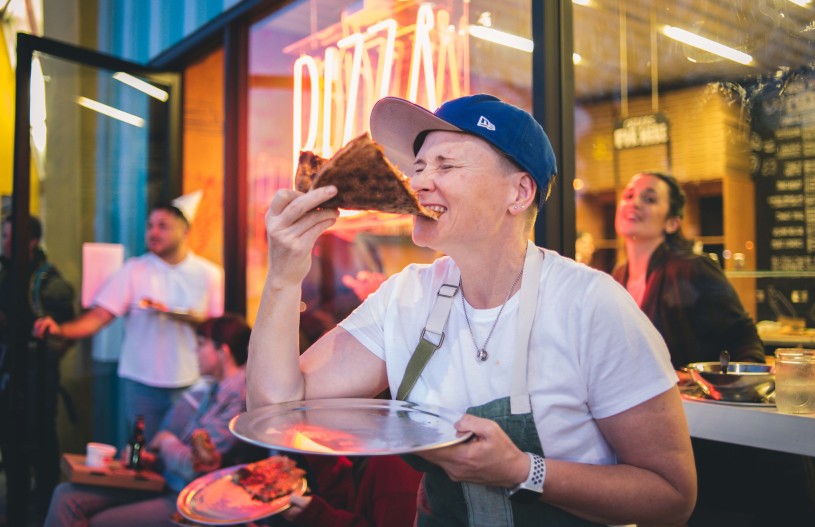
TELL US ABOUT THE FOCACCIA RECIPE YOU’VE DEVELOPED.
A big part of my mission is teaching the staff, both in front and back of the house, that everything is seasonal. Keeping that seasonality is important to me, so when we wanted to add a turkey sandwich to the menu on focaccia bread, we looked to the delicious grape focaccia we used to make. But grapes were not in season then, so we needed to do something different.
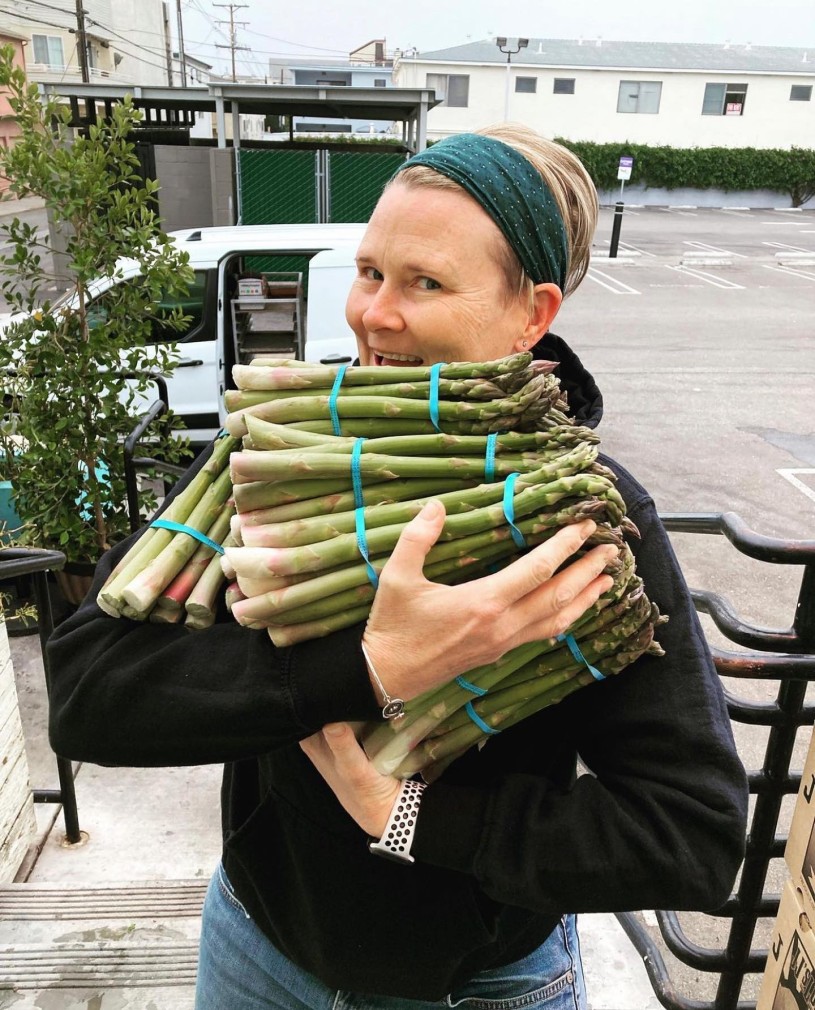
So I reworked the Sicilian pizza crust from Milo SRO (another member of the Rustic Canyon Family) to create a bread that had warmth and softness and added texture to the sandwich. So I had lots of test runs and made this light, airy, soft, and very salty (because I put fleur de sel on the top) bread that is the perfect vehicle for the sandwich. I wanted your mouth to sink into it, and you just feel the bread encapsulating all the other stuff in the sandwich.
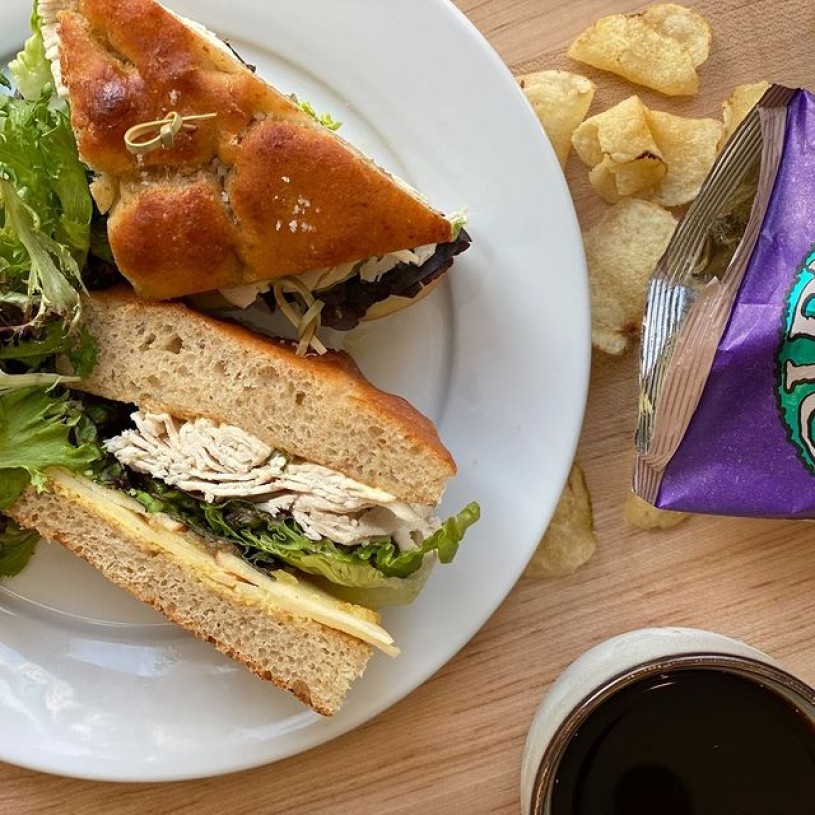
HOW DOES HUCKLEBERRY's BREAD BIND COMMUNITIES TOGETHER?
That’s a very interesting question. Early in the pandemic, people were struggling to find bread, so they would make it at home. Bread is the one food item that people need for survival, and when you have bread on your table, you have sustenance. Bread also creates familiarity and breaking bread keeps your family together.
At Huckleberry, we add bread to many of our dishes—and it’s good bread—but I think that bread provides the warmth and comfort that people need. Bread is everything—bread is just life. If you find good bread, EAT IT.
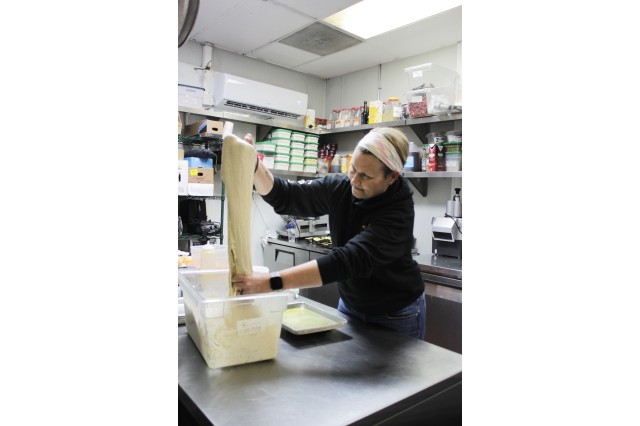
Toomey pulls and stretches the focaccia dough and places it on a rectangular baking sheet.
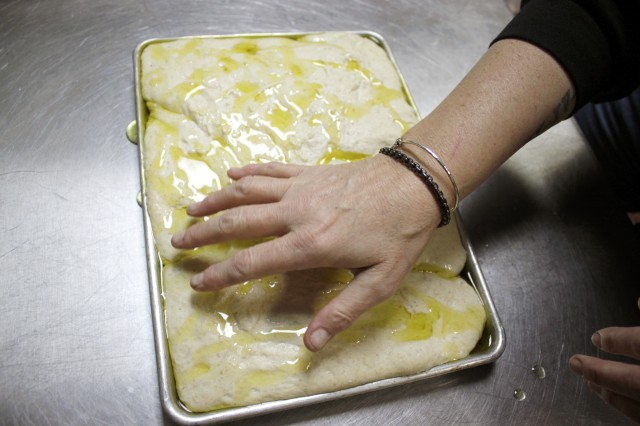
She then tops the dough with a light layer of olive oil.
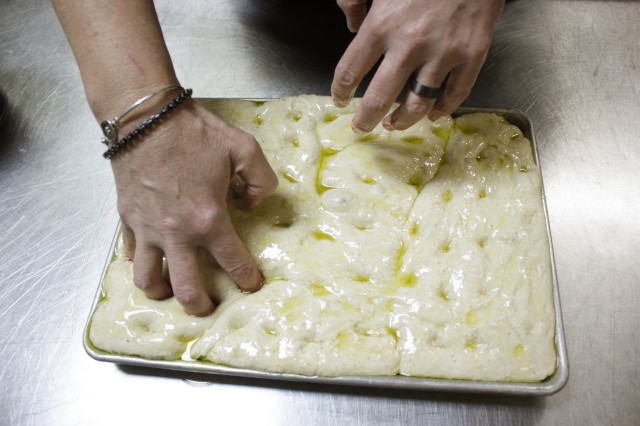
She then makes a pattern of dimples in the dough with her fingers.
1 of 1
Toomey pulls and stretches the focaccia dough and places it on a rectangular baking sheet.
She then tops the dough with a light layer of olive oil.
She then makes a pattern of dimples in the dough with her fingers.
HAS BEING PART OF THE LGBTQ+ COMMUNITY HAD AN IMPACT ON WHERE YOU ARE AS A CHEF TODAY?
I had some struggles, particularly early in my career. I feel that the kitchen environment has been very tough for women and queer individuals of all genders. Cooking is a male-dominated field, and I’ve worked with some very well-known groups where I was ridiculed. I’ve definitely had to struggle to fight for both being gay and for others to respect my relationship.
It’s still a struggle because every time you meet someone new, you’re coming out—every single time. And you just never know what’s going to be accepted. I don’t think it’s hindered my career; it’s motivated me to push harder and stronger and helped me believe in myself. It’s taught me a lot about trusting the people I work with and knowing that trust is there to build our relationship and grow together—I think that’s important.
I want to advocate for the people I work with who are openly gay or not openly gay. I’ve taught culinary arts for nine years and come across many students who are coming out and use me as their sounding board for that. Now, I’m very open about who I am, and I just don’t care what people think.
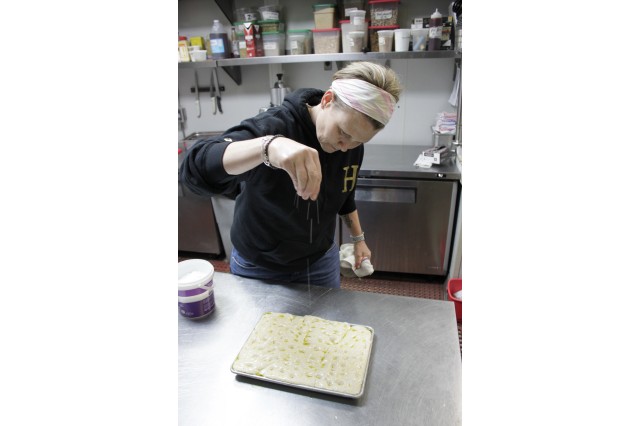
Toomey sprinkles flakey salt on top of the focaccia dough before putting it in the oven.
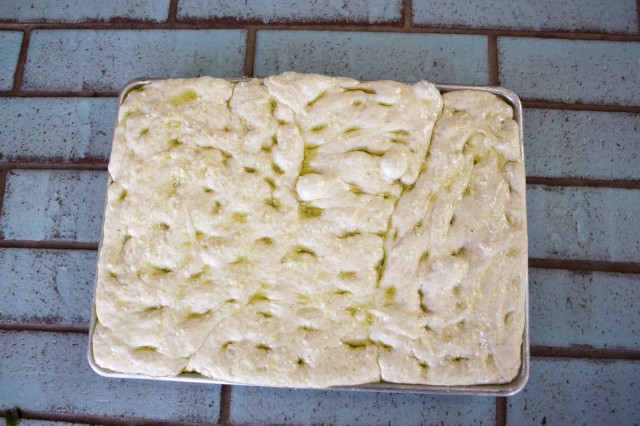
Even just the dough of the focaccia is a sight to behold.
1 of 1
Toomey sprinkles flakey salt on top of the focaccia dough before putting it in the oven.
Even just the dough of the focaccia is a sight to behold.
HOW HAS THE RESTAURANT INDUSTRY CHANGED IN REGARD TO SUPPORTING LGBTQ+ STAFF?
I do think things have gotten better, but there is still a lot of work to be done. I have had many employees come out to me and ask me questions. While it still feels surprising for me to be so open because I am still a private person sometimes, it also feels really good to know people trust me enough and know I am confident in who I am to ask me about my journey. I am fortunate to work with people that span different cultures. Most of my team is Hispanic, and they couldn’t care less about me coming out; they care that I treat them with respect.
HOW DOES HUCKLEBERRY MAKE SPACE FOR THE LGBTQ+ COMMUNITY?
Last June, we made cookies for Pride Month, and little things like that can make a big impact. We try to use our little platform to be inclusive of everybody and consider, “How can we help humans as humans?” We are not singularly focused on serving one community, then the next, and so on—we want to include everybody. I feel that is what I need to be comfortable in my workplace; to feel safe.
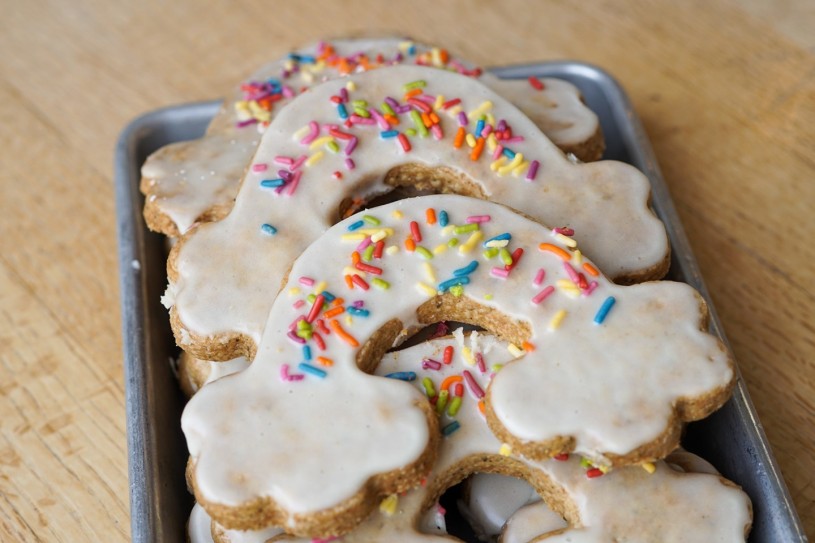
Also, it’s really important [to me] that we touch base with every employee and have conversations with every guest. We aim not to be mechanical. People think we are such a well-oiled machine, and we are [to a certain extent], but we also try to connect to our staff. I wish I could say there was a prescribed method of treating people, but it really just comes down to kindness. Kindness has always been the way the Rustic Canyon Group operates, and that’s why I love this collective. That alone sets this restaurant group apart from any other.
EXPLORE MORE FROM Huckleberry Bakery & Café
To see what’s cooking at Huckleberry Bakery & Café, go to huckleberrycafe.com or visit them in person at 1014 Wilshire Boulevard, Santa Monica, CA 90401.
SHARE YOUR L.A. BREAD STORIES
Do you know an L.A. breadmaker who lovingly connects to your community? Do you want to share your favorite experience at Huckleberry Bakery & Café? Join the conversation by tagging @NHMLA with #KneadedLA, and your story could be featured next!
Following the success of Kneaded: L.A. Bread Stories, we're celebrating the history, heritage, and communities of Los Angeles through the lens of different cultural traditions. This year, L.A. at Play highlights the vibrant and visionary work of artisans who fabricate dolls and figurines using a variety of techniques and materials.
